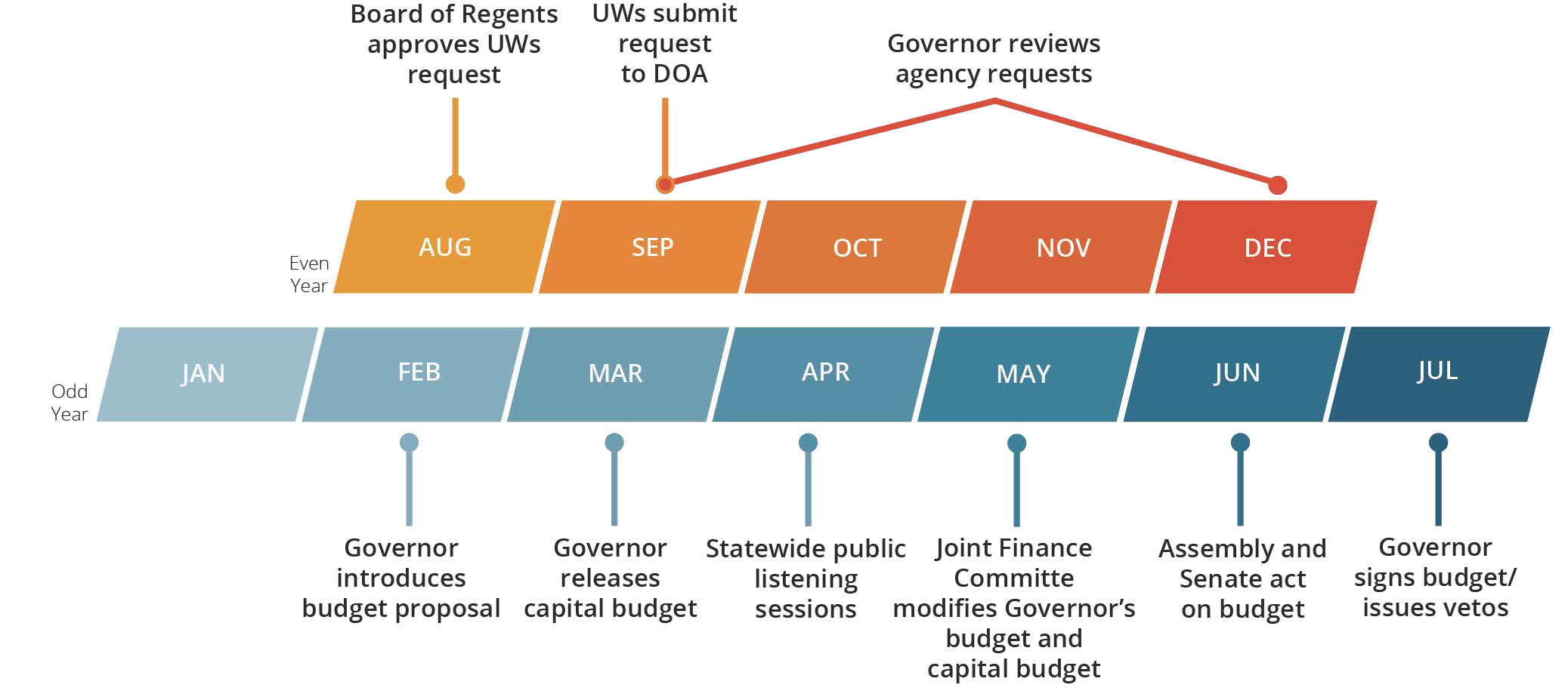Overview
- Wisconsin’s budget is a biennial (two-year) budget that starts July 1 of each odd numbered year and concludes on June 30 of the next odd numbered year. The next biennial budget will start July 1, 2025, and end June 30, 2027.
- The process to create the next biennial budget goes through several stages of deliberation among the executive and legislative branches of state government before enactment.
- This webpage serves to provide general information on the state budget process and the UWs budget request. Be aware that legislative timelines can change.
- If you have specific questions on the state budget, do not hesitate to contact our state government relations staff.
Timeline
| EVEN NUMBERED YEAR | |
| Spring/Summer | Universities of Wisconsin (UWs) and other state agencies prepare budget request proposals. |
| August | Universities of Wisconsin Board of Regents (BOR) reviews and approves budget request. |
| September 15 | Universities of Wisconsin submits approved budget request to the Department of Administration (DOA). |
| November | All agency budget requests submitted to the Governor (or Governor-elect). The Governor (or Governor-elect) reviews the requests and prepares budget proposal. |
| ODD NUMBERED YEAR | |
| January/February | Governor introduces budget proposal. (Governor is required to provide on or before the last Tuesday in January. The date can be extended if agreed to by the Governor and both houses of the legislature) |
| February | Legislature’s Joint Finance Committee starts review of Governor’s budget proposal, including state agency budget briefings. |
| March | Governor releases capital budget. State Building Commission meets to provide recommendations to the Joint Finance Committee on capital budget. |
| April – May | Joint Finance Committee modifies Governor’s budget and capital budget. |
| June | Assembly and Senate act on budget. |
| July | Governor signs budgets; issues vetoes. |
Universities of Wisconsin 2025-27 Biennial Budget Request
On August 22, 2024, the UW System Board of Regents voted to approve the Universities of Wisconsin’s operating budget request for the 2025-27 biennium. Highlights of the proposed $855 million budget request include:
- Emphasizes talent development through student success services.
- Extends the Wisconsin Tuition Promise to students from families earning up to $71,000 in adjusted gross income.
- Proposes 5 percent and 3 percent general wage increases for staff and faculty, and requests the state fully fund the increases while adding a merit and market pool.
- Invests in innovation, including creation of a new Artificial Intelligence (AI) Hub.
- Preserves accessibility while covering inflationary cost increases.
- Support of several initiatives that address student success, including mental health services, academic and career advising, and civil dialogue training
2025-27 Biennial Budget Recommendations PowerPoint (PDF)
Universities of Wisconsin President Jay Rothman Introduction of the budget request
Process
The Department of Administration, Division of Facilities Development and Management receives budget requests from all state agencies and makes a single recommendation to the State of Wisconsin Building Commission. The Building Commission then makes a recommendation to the Legislature through the biennial budget process.
2025-27 Capital Budget Request
On August 22, 2024, the UW System Board of Regents unanimously approved a proposed 2025-27 Capital Budget Request of $1,760,804,000. Key strategic elements of the Capital Budget recommendations include:
- Repairing Aging Facilities – The highest priority programs are designed to repair or renovate aging facilities and infrastructure, thereby reducing deferred maintenance backlogs. A recommended $260 million is proposed to address high priority needs in existing facilities ensuring their viability for the foreseeable future. These projects offset increasing operational costs due to the labor-intensive need to continually maintain the facilities to keep them functioning.
- Replacing Obsolete Facilities – $467 million is requested to construct new facilities to replace existing ones that cannot be renovated cost-effectively to meet academic or program needs. Simultaneously, due to the enumeration of a Multi-Building Demolition project earlier this year, universities currently are on track to remove at least 12 facilities over the course of the next year.
- Expanding STEM and Health Sciences Education – Requests for state funding focus on providing high-quality, up to date facilities that support workforce needs, attract, and retain Wisconsin students, and expand highly sought-after STEM and health sciences education.

